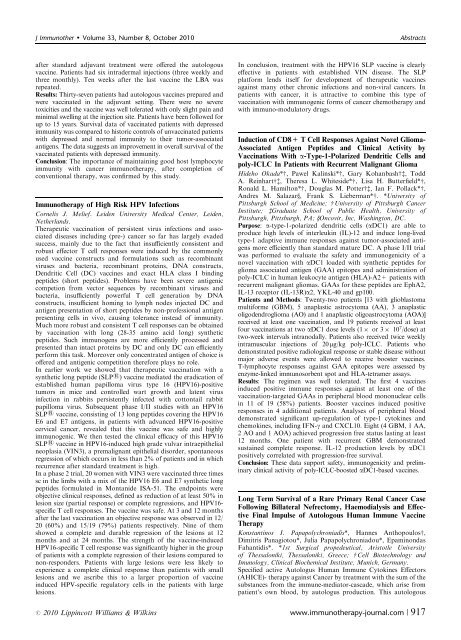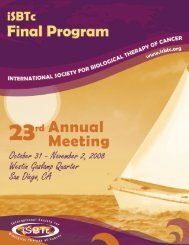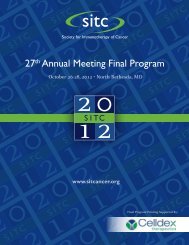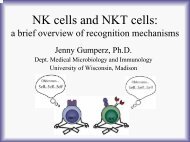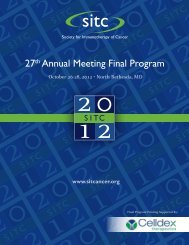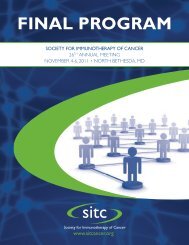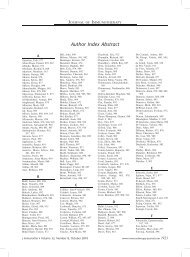Abstracts for the 25th Annual Scientific Meeting of the International ...
Abstracts for the 25th Annual Scientific Meeting of the International ...
Abstracts for the 25th Annual Scientific Meeting of the International ...
Create successful ePaper yourself
Turn your PDF publications into a flip-book with our unique Google optimized e-Paper software.
J Immuno<strong>the</strong>r Volume 33, Number 8, October 2010<br />
<strong>Abstracts</strong><br />
after standard adjuvant treatment were <strong>of</strong>fered <strong>the</strong> autologous<br />
vaccine. Patients had six intradermal injections (three weekly and<br />
three monthly). Ten weeks after <strong>the</strong> last vaccine <strong>the</strong> LBA was<br />
repeated.<br />
Results: Thirty-seven patients had autologous vaccines prepared and<br />
were vaccinated in <strong>the</strong> adjuvant setting. There were no severe<br />
toxicities and <strong>the</strong> vaccine was well tolerated with only slight pain and<br />
minimal swelling at <strong>the</strong> injection site. Patients have been followed <strong>for</strong><br />
up to 15 years. Survival data <strong>of</strong> vaccinated patients with depressed<br />
immunity was compared to historic controls <strong>of</strong> unvaccinated patients<br />
with depressed and normal immunity to <strong>the</strong>ir tumor-associated<br />
antigens. The data suggests an improvement in overall survival <strong>of</strong> <strong>the</strong><br />
vaccinated patients with depressed immunity.<br />
Conclusion: The importance <strong>of</strong> maintaining good host lymphocyte<br />
immunity with cancer immuno<strong>the</strong>rapy, after completion <strong>of</strong><br />
conventional <strong>the</strong>rapy, was confirmed by this study.<br />
Immuno<strong>the</strong>rapy <strong>of</strong> High Risk HPV Infections<br />
Cornelis J. Melief. Leiden University Medical Center, Leiden,<br />
Ne<strong>the</strong>rlands.<br />
Therapeutic vaccination <strong>of</strong> persistent virus infections and associated<br />
diseases including (pre-) cancer so far has largely evaded<br />
success, mainly due to <strong>the</strong> fact that insufficiently consistent and<br />
robust effector T cell responses were induced by <strong>the</strong> commonly<br />
used vaccine constructs and <strong>for</strong>mulations such as recombinant<br />
viruses and bacteria, recombinant proteins, DNA constructs,<br />
Dendritic Cell (DC) vaccines and exact HLA class I binding<br />
peptides (short peptides). Problems have been severe antigenic<br />
competion from vector sequences by recombinant viruses and<br />
bacteria, insufficiently powerful T cell generation by DNA<br />
constructs, insufficient homing to lymph nodes injected DC and<br />
antigen presentation <strong>of</strong> short peptides by non-pr<strong>of</strong>essional antigen<br />
presenting cells in vivo, causing tolerance instead <strong>of</strong> immunity.<br />
Much more robust and consistent T cell responses can be obtained<br />
by vaccination with long (28-35 amino acid long) syn<strong>the</strong>tic<br />
peptides. Such immunogens are more efficiently processed and<br />
presented than intact proteins by DC and only DC can efficiently<br />
per<strong>for</strong>m this task. Moreover only concentrated antigen <strong>of</strong> choice is<br />
<strong>of</strong>fered and antigenic competition <strong>the</strong>re<strong>for</strong>e plays no role.<br />
In earlier work we showed that <strong>the</strong>rapeutic vaccination with a<br />
syn<strong>the</strong>tic long peptide (SLPs) vaccine mediated <strong>the</strong> eradication <strong>of</strong><br />
established human papilloma virus type 16 (HPV16)-positive<br />
tumors in mice and controlled wart growth and latent virus<br />
infection in rabbits persistently infected with cottontail rabbit<br />
papilloma virus. Subsequent phase I/II studies with an HPV16<br />
SLPs vaccine, consisting <strong>of</strong> 13 long peptides covering <strong>the</strong> HPV16<br />
E6 and E7 antigens, in patients with advanced HPV16-positive<br />
cervical cancer, revealed that this vaccine was safe and highly<br />
immunogenic. We <strong>the</strong>n tested <strong>the</strong> clinical efficacy <strong>of</strong> this HPV16<br />
SLPs vaccine in HPV16-induced high grade vulvar intraepi<strong>the</strong>lial<br />
neoplasia (VIN3), a premalignant epi<strong>the</strong>lial disorder, spontaneous<br />
regression <strong>of</strong> which occurs in less than 2% <strong>of</strong> patients and in which<br />
recurrence after standard treatment is high.<br />
In a phase 2 trial, 20 women with VIN3 were vaccinated three times<br />
sc in <strong>the</strong> limbs with a mix <strong>of</strong> <strong>the</strong> HPV16 E6 and E7 syn<strong>the</strong>tic long<br />
peptides <strong>for</strong>mulated in Montanide ISA-51. The endpoints were<br />
objective clinical responses, defined as reduction <strong>of</strong> at least 50% in<br />
lesion size (partial response) or complete regressions, and HPV16-<br />
specific T cell responses. The vaccine was safe. At 3 and 12 months<br />
after <strong>the</strong> last vaccination an objective response was observed in 12/<br />
20 (60%) and 15/19 (79%) patients respectively. Nine <strong>of</strong> <strong>the</strong>m<br />
showed a complete and durable regression <strong>of</strong> <strong>the</strong> lesions at 12<br />
months and at 24 months. The strength <strong>of</strong> <strong>the</strong> vaccine-induced<br />
HPV16-specific T cell response was significantly higher in <strong>the</strong> group<br />
<strong>of</strong> patients with a complete regression <strong>of</strong> <strong>the</strong>ir lesions compared to<br />
non-responders. Patients with large lesions were less likely to<br />
experience a complete clinical response than patients with small<br />
lesions and we ascribe this to a larger proportion <strong>of</strong> vaccine<br />
induced HPV-specific regulatory cells in <strong>the</strong> patients with large<br />
lesions.<br />
In conclusion, treatment with <strong>the</strong> HPV16 SLP vaccine is clearly<br />
effective in patients with established VIN disease. The SLP<br />
plat<strong>for</strong>m lends itself <strong>for</strong> development <strong>of</strong> <strong>the</strong>rapeutic vaccines<br />
against many o<strong>the</strong>r chronic infections and non-viral cancers. In<br />
patients with cancer, it is attractive to combine this type <strong>of</strong><br />
vaccination with immunogenic <strong>for</strong>ms <strong>of</strong> cancer chemo<strong>the</strong>rapy and<br />
with immuno-modulatory drugs.<br />
Induction <strong>of</strong> CD8+ T Cell Responses Against Novel Glioma-<br />
Associated Antigen Peptides and Clinical Activity by<br />
Vaccinations With a-Type-1-Polarized Dendritic Cells and<br />
poly-ICLC In Patients with Recurrent Malignant Glioma<br />
Hideho Okada*w, Pawel Kalinski*w, Gary Kohanbashwz, Todd<br />
A. Reinhartwz, Theresa L. Whiteside*w, Lisa H. Butterfield*w,<br />
Ronald L. Hamilton*w, Douglas M. Potterwz, Ian F. Pollack*w,<br />
Andres M. Salazary, Frank S. Lieberman*w. *University <strong>of</strong><br />
Pittsburgh School <strong>of</strong> Medicine; w University <strong>of</strong> Pittsburgh Cancer<br />
Institute; zGraduate School <strong>of</strong> Public Health, University <strong>of</strong><br />
Pittsburgh, Pittsburgh, PA; yOncovir, Inc, Washington, DC.<br />
Purpose: a-type-1-polarized dendritic cells (aDC1) are able to<br />
produce high levels <strong>of</strong> interleukin (IL)-12 and induce long-lived<br />
type-1 adaptive immune responses against tumor-associated antigens<br />
more efficiently than standard mature DC. A phase I/II trial<br />
was per<strong>for</strong>med to evaluate <strong>the</strong> safety and immunogenicity <strong>of</strong> a<br />
novel vaccination with aDC1 loaded with syn<strong>the</strong>tic peptides <strong>for</strong><br />
glioma associated antigen (GAA) epitopes and administration <strong>of</strong><br />
poly-ICLC in human leukocyte antigen (HLA)-A2+ patients with<br />
recurrent malignant gliomas. GAAs <strong>for</strong> <strong>the</strong>se peptides are EphA2,<br />
IL-13 receptor (IL-13R)a2, YKL-40 and gp100.<br />
Patients and Methods: Twenty-two patients [13 with glioblastoma<br />
multi<strong>for</strong>me (GBM), 5 anaplastic astrocytoma (AA), 3 anaplastic<br />
oligodendroglioma (AO) and 1 anaplastic oligoastrocytoma (AOA)]<br />
received at least one vaccination, and 19 patients received at least<br />
four vaccinations at two aDC1 dose levels (1 or 3 10 7 /dose) at<br />
two-week intervals intranodally. Patients also received twice weekly<br />
intramuscular injections <strong>of</strong> 20 mg/kg poly-ICLC. Patients who<br />
demonstrated positive radiological response or stable disease without<br />
major adverse events were allowed to receive booster vaccines.<br />
T-lymphocyte responses against GAA epitopes were assessed by<br />
enzyme-linked immunosorbent spot and HLA-tetramer assays.<br />
Results: The regimen was well tolerated. The first 4 vaccines<br />
induced positive immune responses against at least one <strong>of</strong> <strong>the</strong><br />
vaccination-targeted GAAs in peripheral blood mononuclear cells<br />
in 11 <strong>of</strong> 19 (58%) patients. Booster vaccines induced positive<br />
responses in 4 additional patients. Analyses <strong>of</strong> peripheral blood<br />
demonstrated significant up-regulation <strong>of</strong> type-1 cytokines and<br />
chemokines, including IFN-g and CXCL10. Eight (4 GBM, 1 AA,<br />
2 AO and 1 AOA) achieved progression free status lasting at least<br />
12 months. One patient with recurrent GBM demonstrated<br />
sustained complete response. IL-12 production levels by aDC1<br />
positively correlated with progression-free survival.<br />
Conclusion: These data support safety, immunogenicity and preliminary<br />
clinical activity <strong>of</strong> poly-ICLC-boosted aDC1-based vaccines.<br />
Long Term Survival <strong>of</strong> a Rare Primary Renal Cancer Case<br />
Following Billateral Nefrectomy, Haemodialysis and Effective<br />
Final Impulse <strong>of</strong> Autologous Human Immune Vaccine<br />
Therapy<br />
Konstantinos I. Papapolychroniadis*, Hannes Anthopoulosw,<br />
Dimitris Panagiotou*, Julia Papapolychroniadou*, Epaminondas<br />
Fahantidis*. *1st Surgical propedeutical, Aristotle University<br />
<strong>of</strong> Thessaloniki, Thessaloniki, Greece; w Cell Biotechnology and<br />
Imunology, Clinical Biochemical Institute, Munich, Germany.<br />
Specified active Autologus Human Immune Cytokines Effectors<br />
(AHICE)- <strong>the</strong>rapy against Cancer by treatment with <strong>the</strong> sum <strong>of</strong> <strong>the</strong><br />
substances from <strong>the</strong> immune-mediator-cascade, which arise from<br />
patient’s own blood, by autologus production. This autologous<br />
r 2010 Lippincott Williams & Wilkins www.immuno<strong>the</strong>rapy-journal.com | 917


